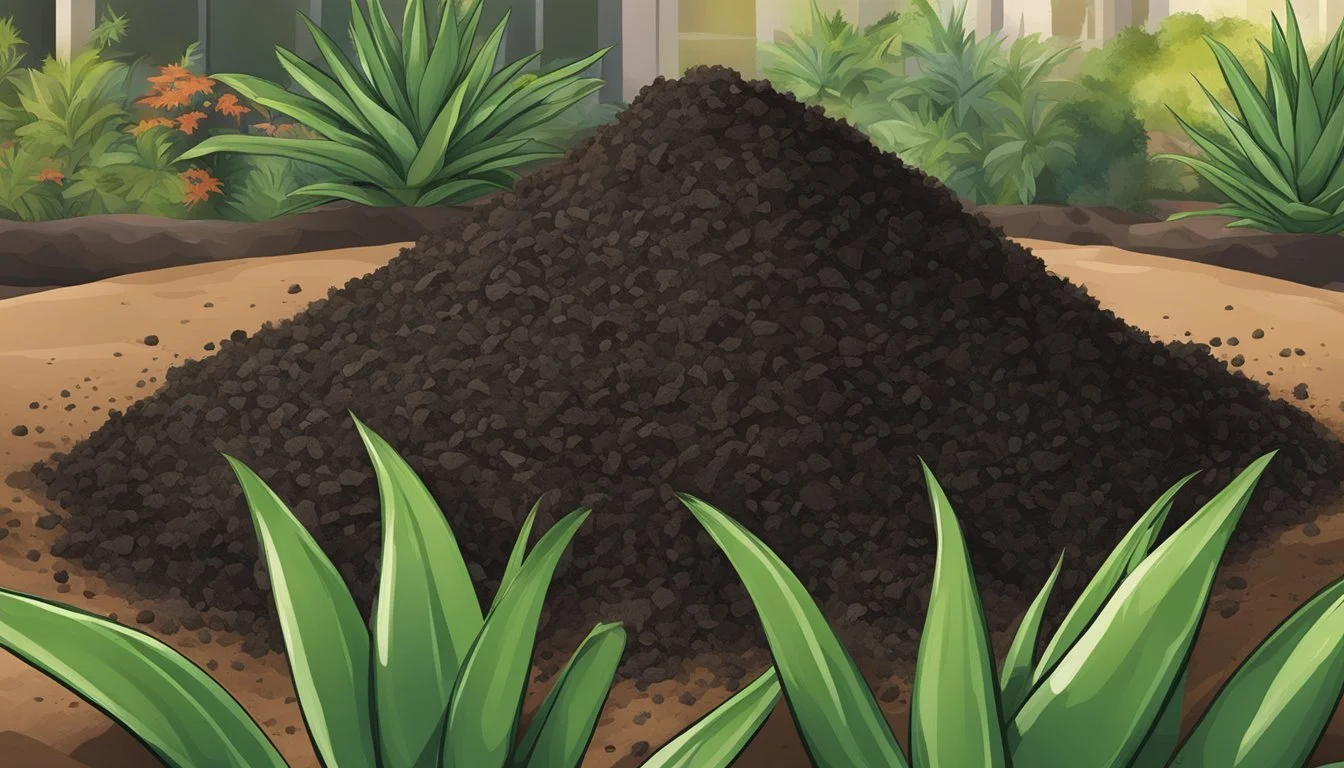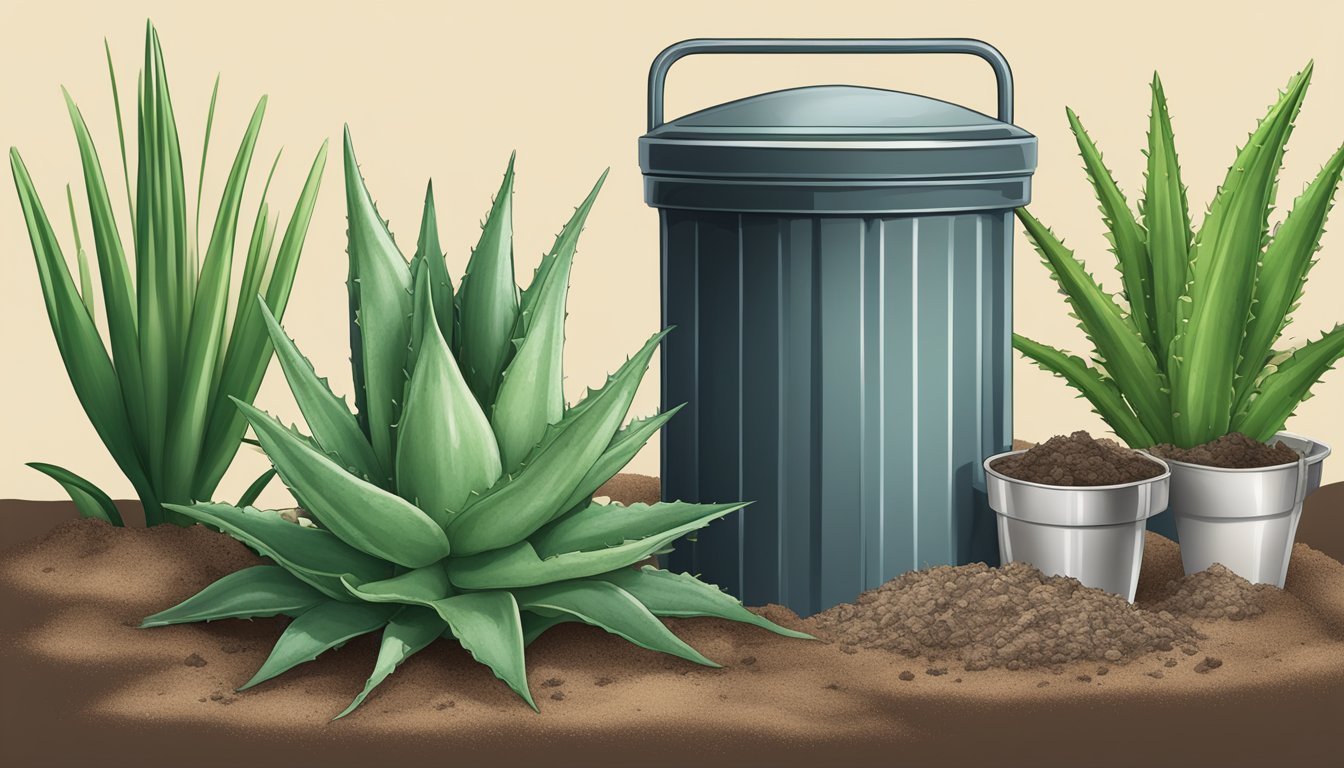Can You Compost Aloe Vera?
Unveiling the Truth About Succulent Scraps
Composting is a natural process that transforms organic waste into rich soil amendments, and aloe vera can participate in this eco-friendly cycle. Aloe vera, renowned for its medicinal properties and succulent foliage, is actually an ally in the composting arena, not just for healing sunburns or moisturizing skin. When added to a compost pile, the leaves of aloe vera introduce beneficial microbes that expedite the decomposition process, ensuring organic material breaks down more efficiently. These microbes enrich the compost by increasing the levels of essential nutrients, thereby enhancing the overall fertility of the end product.
The unique composition of aloe vera helps in balancing the pH levels within the compost pile. An optimal pH is crucial for the survival and function of composting microbes, and aloe vera contributes to creating an ideal environment for these microbes to thrive. Furthermore, the plant's natural gel and thick leaves introduce aeration into the pile, which is vital for oxygenation, reducing compaction, and improving drainage within the compost. By leveraging the properties of aloe vera, composters can achieve a more balanced, nutrient-rich amendment for their gardens.
When it comes to composting aloe vera, it's important to note that the entire plant can be used. Whether it's the leaves, the gel, or the offcuts from pruning, aloe vera can be incorporated into the compost bin without worry. This not only recycles the valuable organic matter but also reduces the waste that would otherwise end up in landfills. By including aloe vera in compost, one can contribute to a more sustainable gardening practice that not only enhances plant growth but also supports environmental health.
Understanding Aloe Vera
Aloe Vera, known for its utility in gardening and health, is a succulent with distinctive characteristics. Its adaptability in various uses makes it a focus for both plant care and medicinal applications.
Characteristics of Aloe Vera
Aloe Vera is a succulent plant that is renowned for its ability to retain water within its thick, fleshy leaves. This water-holding capacity contributes significantly to its distinctive gel, which is rich in enzymes and nutrients. Typically, these leaves manifest in a rosette pattern and are often edged with small teeth. The roots of Aloe Vera are shallow and sprawling, adapted to absorb moisture efficiently from the soil.
Benefits in Gardening and Health
In gardening, Aloe Vera acts as an enriching soil amendment, aiding in plant growth and soil fertility. The gel contains growth hormones which can be beneficial for root development in other plants. As a natural health remedy, it's been applied in skincare for its soothing properties. The enzymes present in Aloe Vera gel make it a valuable resource for moisturizing and healing the skin, addressing concerns like dryness and sunburn.
Types of Aloe Vera
The genus Aloe contains over 500 species, with Aloe barbadensis (also known as Aloe Vera) being one of the most prevalent in the realm of natural health and gardening. This species is highly valued for its medicinal properties and its effectiveness in promoting plant health and moisture retention, particularly in dry, arid climates. Other types of Aloe Vera vary in size, color, and leaf structure, each possessing a unique set of characteristics suited to different environments and uses.
Basics of Composting
Composting is a natural process involving the decomposition of organic materials to create a nutrient-rich soil amendment. This section provides a detailed understanding of composting essentials and the variety of materials suitable for the process.
Composting Essentials
For composting to occur effectively, several key factors should be in balance. These include:
Microbes: The primary agents of decomposition. The presence of bacteria, fungi, and other microorganisms is essential as they break down organic matter.
Carbon and Nitrogen Balance: Materials rich in carbon provide energy for microbes, while nitrogen-rich materials provide the proteins needed for microbial growth.
Moisture: Optimal composting requires sufficient moisture for microbial activity, but not so much that it causes anaerobic conditions.
Structure: Adequate aeration is needed to supply oxygen to the microbes. Structurally varied materials can help ensure proper airflow.
Temperature: Heat is a byproduct of microbial activity and aids in the decomposition process. A well-maintained pile will typically self-heat.
Composting Materials
Compost can be made from a wide range of organic materials. Here are specifics:
Category Examples Green Materials (Nitrogen-rich) Kitchen scraps (fruits, vegetables), coffee grounds, fresh grass clippings Brown Materials (Carbon-rich) Dry leaves, straw, wood chips, shredded paper
Yard Waste: Includes leaves, grass clippings, and small branches. They should be mixed appropriately with kitchen scraps to maintain a balanced carbon to nitrogen ratio.
Kitchen Scraps: Vegetable peelings, fruit waste, and coffee grounds add nitrogen to the compost and are excellent for stimulating microbial activity.
Exclusions: Meat, dairy, and oily foods are typically excluded as they can attract pests and cause odors.
By adhering to these guidelines, one can create a successful compost system that aligns with the Environmental Protection Agency (EPA) recommendations for reducing organic waste in landfills while providing beneficial amendments for gardening and soil enrichment.
Aloe Vera and Composting
When adding aloe vera to a compost bin, it contributes essential nutrients while decomposing at a somewhat slower rate compared to other organic materials.
Aloe Vera as Compost Material
Aloe vera, a succulent plant, is suitable for composting. Its leaves, although thick and fleshy, will break down in a compost pile. The leaves contain moisture and nutrients such as nitrogen, phosphorous, potassium, calcium, magnesium, and iron, which are beneficial to the composting process. Given their sturdy nature, aloe vera takes longer to decompose, thus it should be cut into smaller pieces to expedite the decomposition process.
Key attributes of aloe vera as compost material:
Nitrogen content: Enhances microbial activity
Moisture: Aids in the breakdown of dry materials
Effects on Compost Quality
Incorporating aloe vera into compost can enhance soil structure and water retention in the resulting nutrient-rich soil. These improvements are largely due to the essential nutrients released during the decomposition of aloe vera, which nourish the microorganisms vital for a healthy compost. The nutrients from aloe vera are slowly released into the compost, offering a sustained benefit that supports plant growth over time.
Positive impacts on compost quality:
Nutrient addition: Introduces essential nutrients into the compost
Soil structure: Helps in creating a loamy soil conducive to robust plant growth
Aloe Vera Compost Benefits
Adding aloe vera to compost introduces key nutrients and beneficial properties that enhance soil quality and plant health. This section outlines the specific benefits of incorporating aloe vera gel and its by-products into composting efforts.
Nutritional Contributions to Soil
Aloe vera is a valuable compost addition due to its rich composition of essential nutrients. It contributes important minerals like nitrogen, phosphorous, potassium, calcium, magnesium, and iron—all critical for creating nutrient-rich soil.
Nitrogen is vital for leaf growth and vibrant green coloration.
Phosphorous is crucial for root development and flower/fruit production.
Potassium aids in overall plant vigor and disease resistance.
Calcium helps provide structural support to plant cell walls.
Magnesium acts as a central component of chlorophyll, essential for photosynthesis.
Iron is necessary for energy production within the plant.
Incorporating aloe vera into compost can also improve soil structure, promoting better drainage and aeration, which are beneficial for root growth and health.
Biological Impact on Plant Health
Aloe vera contains enzymes and beneficial microorganisms that help break down organic material more efficiently in the compost. These biological agents quicken the composting process and increase the compost's disease-suppressing qualities due to their antibacterial and antifungal properties.
Enzymes in aloe vera assist in the breakdown of plant and food waste, thereby speeding up the composting process.
The addition of aloe vera fosters a robust population of beneficial microorganisms which are instrumental in nutrient cycling and suppressing soil-borne diseases.
Using aloe vera in composting not only enriches the soil and promotes healthier plant growth but also contributes to the overall ecosystem of the garden by enhancing the biological balance.
Composting Practices
In the context of composting, the addition of aloe vera and the maintenance of optimal compost conditions are crucial for successful decomposition and soil enrichment.
Incorporating Aloe Vera into Compost
Aloe vera serves as an excellent addition to a compost pile due to its richness in nitrogen, an essential element for composting. The fleshy leaves of aloe vera should be chopped before adding them to the compost to speed up the decomposition process. As with all high-nitrogen "greens" in composting, it's important to balance them with "browns" – carbon-rich materials such as dried leaves, straw, or newspaper – to maintain an optimal carbon to nitrogen ratio.
Ideal Conditions for Aloe Compost
To foster efficient composting, maintaining moisture and temperature within the correct range is imperative. The compost should remain as moist as a wrung-out sponge and be kept at a temperature of 55-65°C (131-149°F) to support the activity of decomposing microorganisms. Aeration is another key factor; turning the compost pile periodically prevents anaerobic conditions. Additionally, a mix of sand, perlite, pumice, or horticultural grit can be added to enhance moisture retention and improve the physical structure of the compost. This, in turn, benefits root growth and nutrient uptake when the compost is eventually used to cultivate plants. Keeping pH levels neutral to slightly acidic also ensures an environment conducive to composting and plant health.
Using Aloe Vera Compost
Aloe vera can enhance compost with its rich mineral content and beneficial enzymes when added correctly. This versatile succulent contributes to compost's effectiveness as a soil amendment, particularly influencing soil fertility and structure.
As a Soil Amendment
Aloe vera compost enriches the soil by improving its structure and fertility. When incorporated into the soil, the composted aloe vera can:
Increase Water Retention: Composted aloe vera helps to retain moisture due to the gel's water-holding properties, beneficial for drier soils.
Enhance Soil Fertility: The nutrients released from composted aloe vera leaves promote increased soil fertility, vital for robust plant growth.
Improve Soil Structure: The enzymes and minerals found in aloe vera assist in breaking down organic matter in compost, which in turn improves the soil's texture.
Balance Soil pH: While contributing to the decomposition process, aloe vera compost may also aid in maintaining a neutral pH balance within the soil, providing a conducive environment for various plants.
On Various Plant Types
Whether for houseplants or garden plants, aloe vera compost serves as a nurturing addition. Its use spans across a variety of plant types with noticeable improvements in growth and health:
Houseplants: The nutrient-rich compost is particularly suitable for houseplants, encouraging strong root development and overall vigor.
Garden Plants: Applying aloe vera compost around garden plants can stimulate better seed germination, stronger plant resilience, and improved yield.
Additional Uses of Aloe Vera
Aloe Vera is renowned for its diverse applications beyond composting, particularly in skincare and medicinal domains due to its soothing, antiviral, and immune-boosting properties, as well as its usage in household and cosmetic products for its natural health benefits.
Skincare and Medicinal Uses
Aloe Vera Gel is widely used to alleviate skin irritations, including burns, sunburn, and insect bites. Its antiviral properties, attributed to compounds like saponin, make it beneficial in treating and soothing the skin. The gel's concentration of nutrients aids in skin repair and rejuvenation, solidifying its place in skincare routines.
Skincare: Often found in moisturizers and face masks for its hydrating effect.
Medicinal: Applied directly to affected areas, the gel serves as a natural treatment for minor wounds.
Household and Cosmetic Applications
Aloe Vera finds its way into various household products, with the gel and powder form incorporated into an array of cosmetic and personal care items. Aloe Vera powder, used at a specific concentration, can serve as a natural rooting hormone, promoting plant growth when used in gardening.
Cosmetic Purposes: Utilized in shampoos and conditioners for its saponin content, which helps cleanse and create a soothing effect on the skin.
Natural Health: As a supplement, it supports the immune system and is marketed for its wellness benefits.







